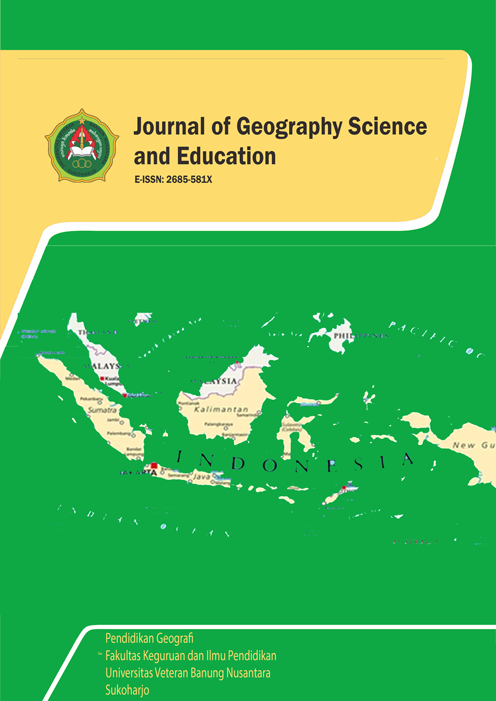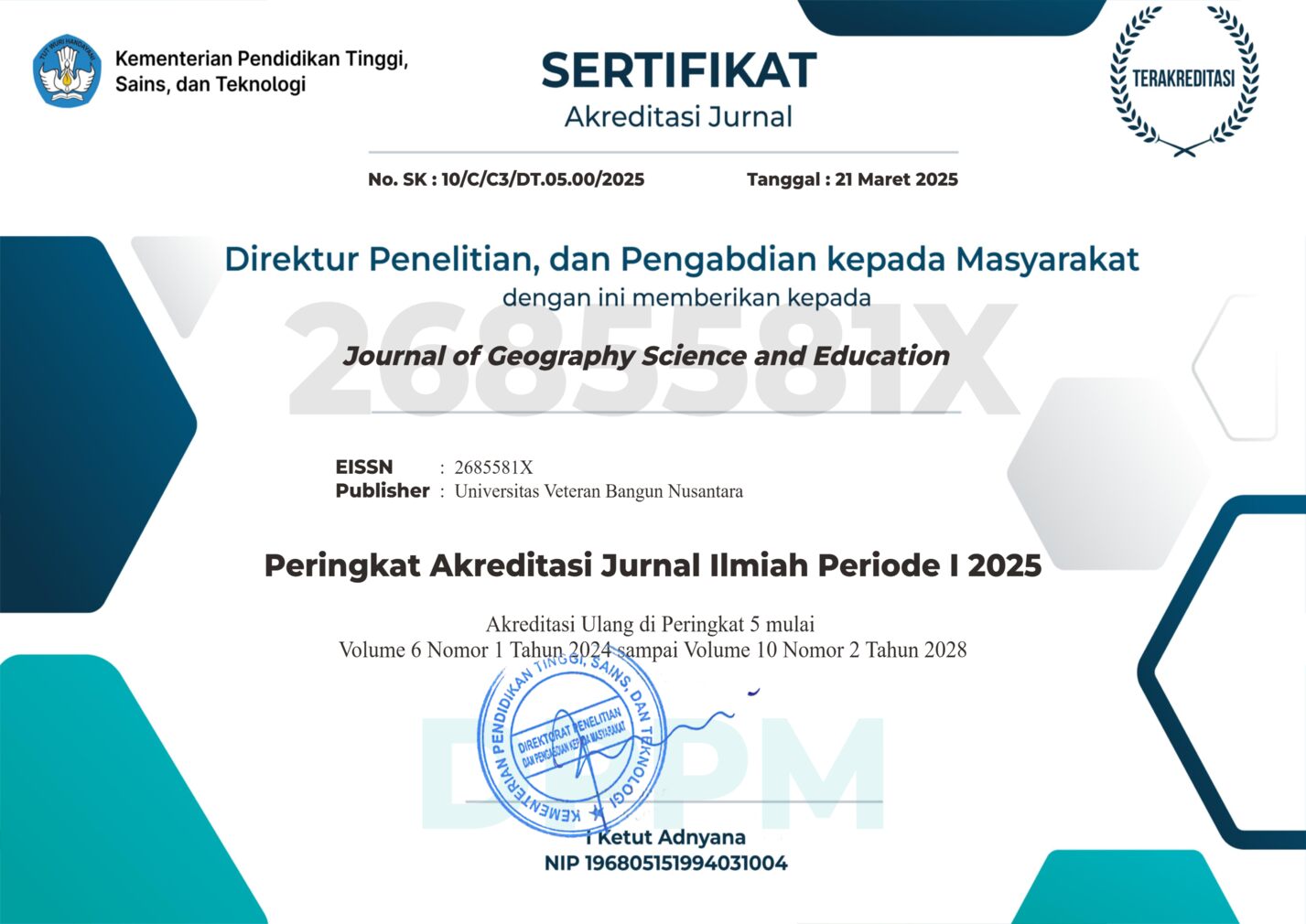FIELD-BASED EXCURSION (FBE) IN THE TEACHING AND LEARNING OF GEOGRAPHY IN SOME SELECTED SECONDARY SCHOOLS IN ONDO STATE, NIGERIA
DOI:
https://doi.org/10.32585/jgse.v5i1.3695Keywords:
Secondary school, Field based excursion, teaching, curriculum, geographyAbstract
The age long tradition of Field-Based Excursion (FBE) is being eroded as effective learning strategy in secondary schools. This study considers investigating FBE and the teaching and learning of geography in some selected secondary schools in Akoko Southwest, Ondo State, Nigeria with a view to examining; the practice of FBE in the selected secondary schools, students’ perceptions to FBE practice in secondary school, FBE and perceived relationship with geography subject, and FBE and learning impacts on secondary school students. The sample population consists of students of secondary school offering Geography as a subject in Akoko Southwest Area of Ondo State, Nigeria. Purposive sampling technique was adopted in selecting twelve (12) secondary schools, while ten (10) students each were randomly selected from sampled schools. This sample gave a total of one hundred and twenty (120) respondents in this study. Learning and Excursion Questionnaire (LEQ) was built using four points Likert scale with Mean Weight Values (MWV) and Grand Mean Value (GMV) for perception analysis. The decision states, accept the perception if the MWV is greater than the MWV; and reject, if otherwise. Results show that; responses denote excursion is no longer part of school curriculum, group excursion could be a preferred mode of FBE for optimum productivity, all aspects of geography require FBE for better understanding” was ranked 1st on MWV=3.55, which signifies high level of relationship, It is worthy of note that significant impacts of FBE has far enriching impacts on students’ learning habits. The study concludes that efforts are needed to reintroduce FBE for quality educational delivery. It therefore recommends that there should be a reintroduction of FBE into secondary school curriculum so it can be made compulsory for students. Government and stakeholder at different levels should ensure adequate sponsor of FBE to bridge the cap for less privileged students. Teachers should introduce field-based approach to teaching methods.
Downloads
References
Amosa A.A. (2013). Effect of community resources on junior secondary schools’ performance in basic technology in Ilorin, Kwara State, Nigeria. Journal of Education in Developing Areas (JEDA), 21, 214-221. Corpus ID: 59108350.
Casinader, N. (2016). Geography and fieldwork: Intelligence in the wild. Interaction, 44(1), 6–7.
Cohen, D. K., Raudenbush, S. W., & Ball, D. L. (2002). Resources, Instruction, and Research. In Mosteller, I. F. & Boruch, R., (Eds.), Evidence matters: Randomized trials in education research. Washington, DC: Brookings Institution Press.
Fuller, I., Edmondson, S., France, D., Higgitt, D., & Ratinen, I. (2006). International perspectives on the effectiveness of Geography fieldwork for learning. Journal of Geography in Higher Education, 30, 89–101.DOI: 10.1080/03098260500499667.
Hope, M. (2009). The Importance of Direct Experience: A Philosophical Defence of Fieldwork in Human Geography. Journal of Geography in Higher Education, 33(2), 169-182. https://doi.org/10.1080/03098260802276698.
Instructional Strategies Online (2013). What are Field trips? Retrieved from olc.spsd.sk.ca/DE/PD/instr/strats/fieldtrips/index.html.
Kurdziolek, M. A. (2011). Classroom resources and impact on learning. Unpublished Dissertation submitted to the faculty of the Virginia Polytechnic Institute and State University in partial fulfillment of the requirements for the degree of Doctor of Philosophy in Computer Science.
Lampert, M. (2001). Teaching problems and the problems of teaching. New Haven, CT: Yale University Pres.
Marsh, C., & Hart, C. (2011). Teaching the Social Sciences and Humanities in an Australian Curriculum, (6th ed.). Frenchs Forest, NSW: Pearson Australia.
Matthews, S., & Cranby, S. (2014). Geography in the Australian curriculum. In R. Gilbert & B. oepper (Eds.), Teaching humanities and social sciences: History, geography, economics & citizenship, (5th ed.) (pp. 223– 247). South Melbourne: Cengage Learning Australia.
Muganga L., and Ssenkusu P., (2019) Teacher-Centered vs. Student-Centered; The Authentic Learning Education Model. Cultural and Pedagogical Inquiry, Vol 11 (2) pp. 16-40. DOI: 10.18733/cpi29481.
Rogers, A. and Viles, H. (eds.) (2003).The Student’s Guide to Geography, pp. 3-5. Oxford: Blackwell Publishing.
Scott, I., Fuller, I., Gaskin, S. (2006). Life without Fieldwork: Some Lecturers' Perceptions of Geography and Environmental Science Fieldwork. Journal of Geography in Higher Education, 30 (1), 161-171. DOI: 10.1080/03098260500499832.
Smith, E. R. (2001). From the Holiday to the Academy: implications for physical geography in higher education arising from 'popular' field-based geography in Dorset”. Journal of Geography in Higher Education, 25 (2), 241- 248.https://doi.org/10.1080/03098260120067718
Taylor, T., Boon, D., & Kriewaldt, J. (2012). The permeable classroom. In T. Taylor, C. Fahey, J. Kriewaldt, & D. Boon, (Eds.). Place and time: Explorations in teaching Geography and History (pp. 245–278). Frenchs Forest, NSW: Pearson Australia.
Yueng, P. M. (2009). The New Senior Secondary Geography Curriculum: Challenges and Prospects. Hong Kong Teachers Centre Journal, 8: 52-63.
Yusuf, A. (2006). Effect of field trip method of teaching on students’ performance in Social Studies. Ilorin Journal of Education, 2, 7‐17.
Downloads
Published
How to Cite
Issue
Section
License
Authors who publish with the Journal of Geography Science and Education agree to the following terms:
- Authors retain copyright and grant the journal the right of first publication with the work simultaneously licensed under a Creative Commons Attribution License (CC BY-SA 4.0) that allows others to share the work with an acknowledgment of the work's authorship and initial publication in this journal.
- Authors are able to enter into separate, additional contractual arrangements for the non-exclusive distribution of the journal's published version of the work (e.g., post it to an institutional repository or publish it in a book), with an acknowledgment of its initial publication in this journal.
- Authors are permitted and encouraged to post their work online (e.g., in institutional repositories or on their website) prior to and during the submission process, as it can lead to productive exchanges, as well as earlier and greater citation of published work.










